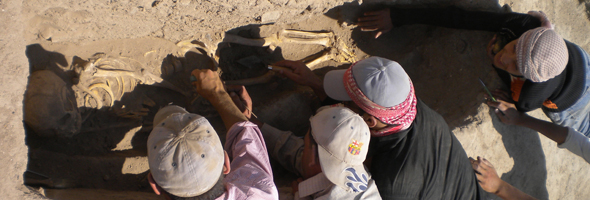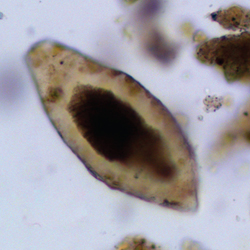Researchers recently found what might be the oldest evidence of man-made technology inadvertently causing disease outbreaks, thanks to the discovery of a schistosomiasis parasite egg in a 6200-year-old grave at a prehistoric town by the Euphrates river in Syria.
The discovery at Tell Zeidan in Syria shows that the parasite infected humans there at least a thousand years earlier than has been found in Egypt. The oldest schistosomiasis egg found previously was in Egyptian mummies from 5200 years ago. The egg was found in the pelvic area of the burial where the intestines and bladder would have been during life. Control soil samples from the head and foot areas of the grave contained no parasitic eggs, suggesting that the gravesite was not contaminated with the parasite more recently.

Excavating a chalcolithic burial at zeidan. Credit: Gil Stein, Oriental Institute, University of Chicago
Schistosomiasis is a disease caused by several species of flatworm parasites that live in the blood vessels of the bladder and intestines. Infection can result in anemia, kidney failure, and bladder cancer. This research shows it may have been spread by the introduction of crop irrigation in ancient Mesopotamia, the region along the Tigris-Euphrates river system that covers parts of modern-day Iraq, Iran, Kuwait, Syria, and Turkey.
“The individual who contracted the parasite might have done so through the use of irrigation systems that were starting to be introduced in Mesopotamia around 7500 years ago. The parasite spends part of its life cycle in snails that live in warm fresh water, before leaving the snail to burrow through the skin of people wading or swimming in the water,” said co-author Dr Piers Mitchell, from the Division of Biological Anthropology at the University of Cambridge. “These irrigation systems distributed water to crops and may have triggered the beginning of the enormous disease burden that schistosomiasis has caused over the past 6000 years.
“Schistosomiasis has become progressively more common over time so that it causes a huge burden across the world today, with over 200 million people infected. It causes anemia which significantly decreases physical productivity in infected people, and may also cause bladder cancer. We would expect these consequences in ancient peoples to have had a significant impact upon early civilizations in the region.”

Schistosome egg recovered from the pelvic sediment of a human individual dated between 6,500 and 6000 years ago. Credit: Piers Mitchell
Citation: Evilena Anastasiou, Kirsi O Lorentz, Gil J Stein, Piers D Mitchell, 'Prehistoric schistosomiasis parasite found in the Middle East', The Lancet Infectious Diseases, Volume 14, Issue 7, Pages 553 - 554, July 2014 doi:10.1016/S1473-3099(14)70794-7. Source: Cambridge University





Comments